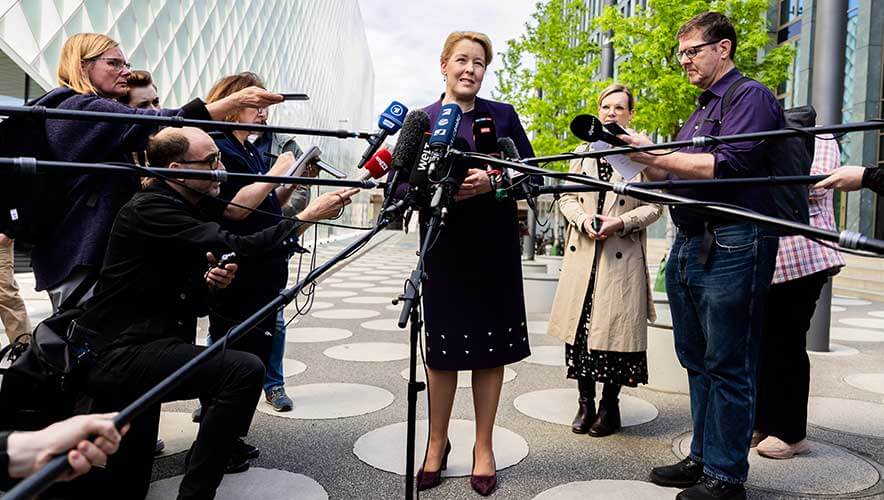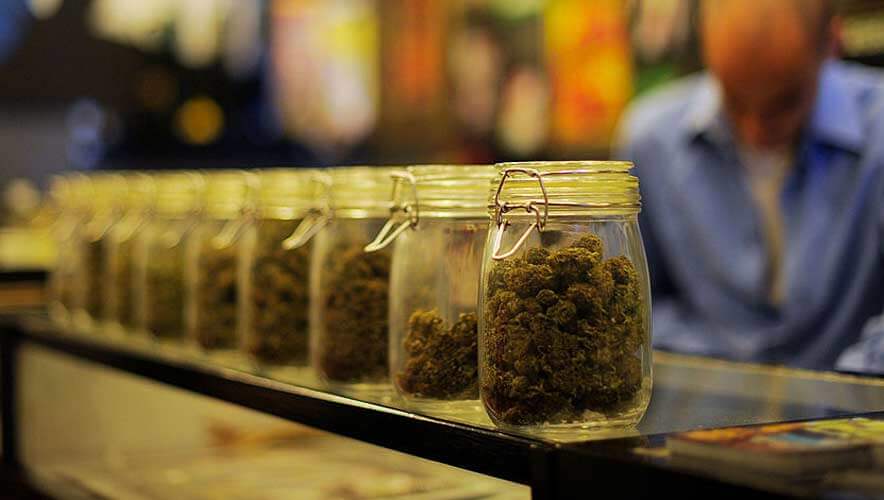Concerns Rise as Attacks Against German Politicians Increase Ahead of Elections
As elections near in Germany, politicians from the Green and Social Democratic parties are being increasingly targeted, suffering violent assaults.
On 7 May, Franziska Giffey, a prominent Berlin politician who currently serves as the city’s top economic official and previously served as the city’s mayor and a federal minister, was attacked while attending an event in a library. The attacker hit Giffey from behind with a bag filled with a hard item or items, the Associated Press reported.
After the attack, Giffey, a Social Democrat, was taken to a hospital and treated for pain in her head and neck.
A suspect in the attack—a 74-year-old man—was held by police, and his home was searched, according to law enforcement. No motive for the attack has been announced yet. The man was already known to police, and prosecutors said that he might have been in a mental crisis and were therefore considering if the man should be admitted into psychiatric care, according to the BBC.
Also on Tuesday, another politician was attacked in Dresden. Two people assaulted a 47-year-old member of Germany’s Green Party while she was campaigning and putting up political posters. Yvonne Mosler, who is running for a seat on the city’s council, and others were threatened, insulted, pushed, and spat upon by two suspects, a 34-year-old man and 24-year-old woman.
Last week, Matthias Ecke, 41, was severely beaten while campaigning in Dresden. Ecke, a candidate for the Social Democrats (SDP), was putting up election posters on the evening of 3 May when four men attacked him. He was taken to a hospital and required emergency facial surgery for the injuries he sustained, according to CNN’s affiliate, ntv.
Police said that the same group had apparently attacked a Green Party worker minutes before in the same street, the AP reported.
Police are investigating four teenagers in connection with the attack on Ecke, and at least one of the suspects has been linked to the far right, the BBC reported.
One of the suspects, a 17-year-old male, turned himself in on 5 May, and police have since identified three other suspects, searching their homes. “Investigators said evidence was confiscated and was now being evaluated. All four are said to be aged either 17 or 18,” Deutsche Welle (DW) reported.
Government and opposition parties claim that party members and supporters have been increasingly subjected to physical and verbal attacks, and several of the clashes have occurred in eastern areas of the nation. In this region—which was formerly East Germany when it was occupied and controlled by the USSR—German chancellor Olaf Scholz and his party, the SDP, are largely unpopular. The eastern state of Saxony reported 112 reports of election-related crimes in 2024, with 30 of the incidents including victims who are elected officials, according to the AP.
Die Angriffe auf Franziska Giffey und andere Politikerinnen und Politiker sind empörend und feige. Wer sich engagiert, verdient Respekt. Gewalt gehört nicht in die demokratische Auseinandersetzung. Die Anständigen und Vernünftigen stehen klar dagegen – und sie sind die Mehrheit!
— Bundeskanzler Olaf Scholz (@Bundeskanzler) May 8, 2024
Rallies protesting against the use of violence and fascism occurred in Dresden in response to the recent attacks.
Mainstream political parties have accused the nation’s far-right party, Alternative for Germany (AfD), of links to violent neo-Nazi groups, of wanting to reverse European integration, and of creating an increasingly intimidating political environment. Germany’s domestic intelligence service listed AfD’s Thuringia branch as a right-wing extremist group a little more than four years ago and placed it under official surveillance.
Co-chair of the AfD Tino Chrupalla defended his party and said the AfD condemns any physical attacks against politicians, regardless of their political affiliation, according to the AP.
The AfD has gained significant support and membership since its founding in 2013, especially in the eastern states that were formerly under communist control and have seen less prosperity compared to the western states. While the party is hoping to become the dominant political party in state elections in September, the AfD is hoping to make significant gains in the upcoming German European Parliamentary elections on 9 June, according to the BBC.
Pressure and pain points in Germany—including inflation and a massive increase in asylum seekers and immigrants from Afghanistan, Syria, and Turkey—have fueled the AfD’s popularity, especially after Scholz was elected more than two years ago.
Scholz condemned the attacks on political figures and their supporters, and federal and state ministers convened on 7 May to discuss measures to increase the safety of politicians. “These include greater police presence at political events both at the local and the federal level, as well as better protection of the privacy of politicians,” DW reported.
The ministers supported proposals for stricter punishments against attackers responsible for an assault or bodily harm against a politician and campaign workers.












